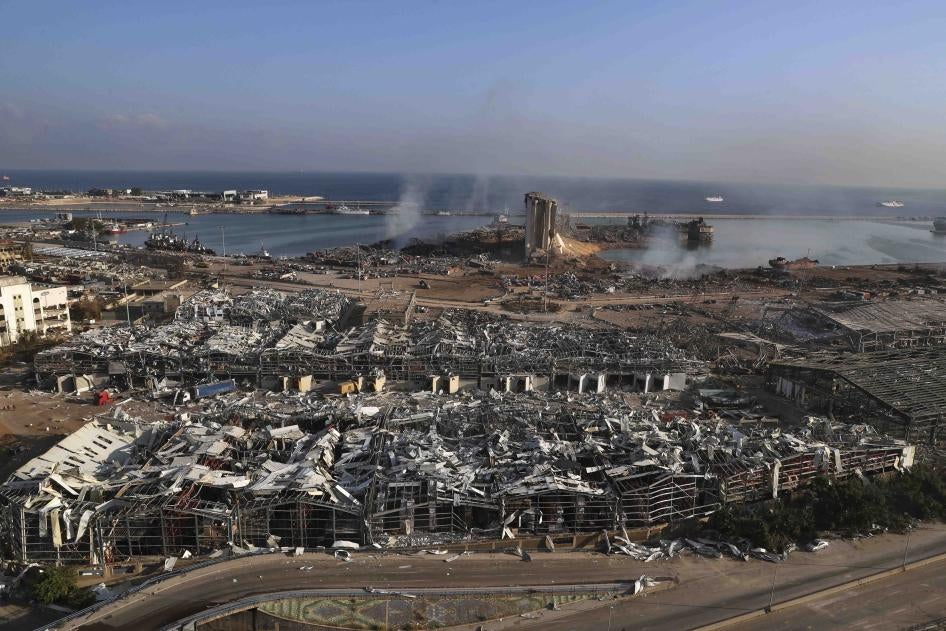(Beirut) – Lebanese authorities should invite international experts to conduct an independent investigation into the explosion at Beirut’s shipping port on August 4, 2020, that devastated the city, Human Rights Watch said today. The investigation should determine the causes and responsibility for the explosion and recommend measures to ensure it cannot happen again. The Lebanese government should ensure that those affected by the blast have access to adequate housing, food, water, and health care, with all aid distributed fairly and impartially.
The blast was apparently the most powerful Beirut has ever experienced. President Michel Aoun and Prime Minister Hassan Diab said the explosion was caused by 2,750 tons of ammonium nitrate, which is used as a fertilizer and can be a bomb ingredient. They also said the material had been stored in a warehouse in the Beirut port for over six years without appropriate safety precautions. The circumstances that led to the detonation of the material are not yet clear. President Aoun has promised a transparent investigation into the causes of the explosion, pledging that those responsible would face “serious punishment.”
“The level of devastation in Beirut is incomprehensible, and the responsible authorities should be held accountable,” said Aya Majzoub, Lebanon researcher at Human Rights Watch. “Given the Lebanese authorities’ repeated failure to investigate serious government failings and the public’s distrust of government institutions, an independent investigation with international experts is the best guarantee that victims of the explosion will get the justice they deserve.”
Lebanon’s Cabinet decided on August 5 to place under house arrest all port officials who oversaw storage and guarding facilities since 2014, but it was not immediately clear what charges they faced or if due process would be accorded to those under investigation.
Human Rights Watch expressed serious concerns about the ability of the Lebanese judiciary to conduct a credible and transparent investigation on its own. Lebanese and international rights groups have for years documented political interference in the judiciary and criticized its lack of independence. Human Rights Watch has documented previous instances in which the judiciary failed to adhere to the rule of law or to conduct independent and thorough investigations into allegations of government abuses. Further, initial evidence suggests that some judges were aware that the ammonium nitrate was stored in Beirut’s port and allegedly failed to take action.
On August 5, the Lebanese Red Cross announced that more than 135 people had been killed and more than 5,000 injured in the explosion, and warned that the death toll could rise further as dozens remained missing. The Beirut governor, Marwan Abboud, told Agence France-Presse that over half the city had been damaged, leaving 300,000 of Beirut’s residents homeless. He estimated that the cost of the damage from the explosion exceeded $3 billion. Human Rights Watch researchers observed the devastation from the blast and saw entire neighborhoods reduced to rubble.
The explosion overwhelmed Lebanon’s healthcare facilities, which were struggling due to the country’s acute financial crisis exacerbated by the Covid-19 pandemic. At least two hospitals were badly damaged in the explosion. Human Rights Watch observed staff at the Saint George University Hospital evacuating patients from the damaged building and tending to patients in the parking lot, using their mobile phones for light. As hospitals in Beirut reached capacity, people injured in the blast were transported to hospitals as far away as Nabatieh and Tripoli – more than 70 kilometers from Beirut.
The Lebanese government still has not disseminated consistent or accurate information about the health impact of the toxic cloud of nitrous oxide hanging over the city, and has not provided guidance for Beirut residents on how to protect themselves from air pollution. Health experts and the US Embassy have advised residents to stay indoors and wear masks.
The destruction of the Beirut Port, which handles 60 percent of Lebanon’s imports, has raised fears over food security. Even before the blast, Lebanon’s unprecedented economic crisis, compounded by Covid-19, had wiped out more than 80 percent of the national currency’s value and plunged more than half the population into poverty. In April, the Social Affairs Minister predicted that more than 75 percent of the population would need aid. Human Rights Watch warned then that more than half the population was at risk of hunger unless the government put in place a coordinated plan to provide assistance. No such plan has been put forward.
Lebanon imports nearly all of its vital goods. Drone footage by the Associated Press showed that the silos where an estimated 85 percent of Lebanon’s wheat was stored have been completely wrecked. Economy Minister Raoul Nehme told Reuters there is “a bit less than a month” of grain reserves in Lebanon’s remaining storage silos but claimed that currently, “There is no bread or flour crisis” due to existing inventory and incoming shipments.
The Lebanese government should ensure that those affected by the blast have access to adequate housing, food, water, and health care. Donor countries should ensure that any aid to Lebanon is distributed transparently and based on humanitarian principles of neutrality, impartiality, and independence and with appropriate safeguards to avoid corruption. Special attention should be given to the needs of vulnerable groups, including children, migrant workers, and refugees. It is unlawful for the government to discriminate in access to such basic rights on the basis of gender, nationality, refugee status, or any other grounds.
Despite its resource limitations, the Lebanese government is obligated to ensure that everyone affected has access to adequate shelter immediately and adequate housing in the medium term. Lebanon is also obligated to provide all residents of the country access to information concerning the main health problems in the community, including methods of preventing and controlling them.
Many countries, including France, Canada, the United Kingdom, and Qatar, have already pledged assistance. They should ensure that any humanitarian assistance they provide goes directly to those affected or through organizations providing life-saving assistance on the ground. Donor countries should also consider providing assistance to investigate responsibility for the explosion.
Reuters quoted an unnamed official source saying that initial investigations “indicate years of inaction and negligence” over the storage of the highly explosive ammonium nitrate. The source added that “nothing was done” to order the material removed or disposed of, although the issue had been raised before several committees and judges. Reuters reviewed two documents showing that Lebanese Customs had asked the judiciary in 2016 and 2017 to re-export or approve the sale of the hazardous materials. One document cited similar requests in 2014 and 2015. Reuters reported that another source close to a port employee said a team that inspected the ammonium nitrate six months ago warned that it could “blow up all of Beirut” if not removed.
An independent investigation with the participation of international experts should determine the causes of the deaths and who was responsible. This would include why and how a huge quantity of highly combustible and potentially explosive material came to be stored in Beirut’s port for years, and what triggered the explosion. It should identify all officials who knew about the long-term storage of this material and those who failed to act. The Lebanese government should invite eminent international experts, including the UN special rapporteur on the implications for human rights of the environmentally sound management and disposal of hazardous substances and waste to participate in the inquiry.
The Lebanese authorities should ensure such an investigation can obtain all the evidence it needs, and comply with any recommendations concerning accountability for this explosion and to ensure such a disaster can never be repeated.
If officials did in fact have notification of a clear threat to life and failed to take reasonable steps to address that threat, then they are responsible for the unlawful deaths of at least 135 people, Human Rights Watch said. In 2001, an explosion involving a warehouse storing ammonium nitrate in Toulouse France resulted in compensation of over 2 billion euros for victims and their survivors. Lebanese authorities should take immediate action to identify any other hazardous operations or stockpiles in the country and mitigate any risks they cause to life and safety. Lebanese authorities should also undertake a comprehensive assessment of the full costs of the explosion to Lebanese residents as a first step toward developing a plan to compensate those affected.
“The devastating impacts of this blast will be borne by Lebanon’s residents for years to come,” Majzoub said. “The Lebanese government has a responsibility to ensure that the disaster response complies with human rights. International experts and international financial support will be essential for making sure the investigation is free from political interference and that victims receive the support they need.”
|
News Release
Lebanon: Set Impartial, Expert Probe of Beirut Blast
Make Sure Aid Distribution is Fair, Impartial, Includes the Most Vulnerable
Your tax deductible gift can help stop human rights violations and save lives around the world.
Region / Country
Most Viewed
-
November 25, 2019
A Dirty Investment

-
May 12, 2025
The Gig Trap

-
April 27, 2021
A Threshold Crossed

-
January 23, 2018
Hidden Chains

-
September 30, 2024
“They Destroyed What Was Inside Us”





